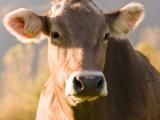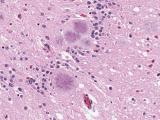Mar 2, 2004 (CIDRAP News) A Kansas meat company is proposing to revive its beef exports to Japan by testing all cattle for bovine spongiform encephalopathy (BSE)a proposal that has put the US Department of Agriculture (USDA) on the spot.
Creekstone Farms, based in Arkansas City, Kan., wants the USDA to approve a rapid BSE test so its proposed testing program can get started. Japan and some European countries have been using rapid tests to screen cattle carcasses for BSE, or mad cow disease, but no such tests have been approved for use in the United States.
"If they [rapid tests] are already being used, it should be a pretty quick procedure to allow us to use the same test," Bill Fielding, Creekstone's chief operating officer, told CIDRAP News.
Many countries have stopped importing American beef since a BSE-infected cow was discovered in Washington state last December. Japan, a major importer, has called for BSE testing of all cattle carcasses as a condition of lifting the ban.
The USDA's BSE testing program has focused mainly on cattle that couldn't walk or looked sick when presented for slaughter. After the BSE case was found, the agency banned the use of "downer" cattle for food and promised to increase BSE testing. But agency officials have said that universal testing would be expensive and, given the low risk of BSE in US cattle, unnecessary. Until now, it appeared that all beef processors shared that point of view.
In February, an advisory panel of experts that reviewed the USDA's response to the BSE case agreed that testing all cattle for BSE is unnecessary, but recommended an increased testing program that would include some healthy-looking cattle over 30 months old. BSE tests by the USDA currently take several days.
Fielding said the test Creekstone proposes to use yields a result in about 4 hours and would cost an estimated $20 per cow. He declined to name the test. (A report in the New York Times last week said Bio-Rad, Inc., of Hercules, Calif., which sells BSE test kits to Japan, had talked with Creekstone but had no plans to sell any test kits without legal approval.)
Fielding called the testing proposal "a very simple, straightforward business decision, because we can increase our net profitability by doing it." He said the company slaughters 1,000 head of cattle daily and, before the BSE case, shipped 15% to 20% of its meat to Japan.
"We're in complete agreement that the food supply is very safe and, statistically, this [testing] may not be needed," Fielding said. "The customers understand all thatJapan and the other countriesand they're still asking that this be done and they're willing to pay for it."
The USDA says it is carefully evaluating Creekstone's proposal, which the agency calls unique. Jim Rogers, a USDA spokesman in Washington, DC, said he couldn't predict when the agency would respond to the proposal.
Rogers read a statement by J. B. Penn, undersecretary for farm and foreign agricultural services, who said, "We have received a request from Creekstone Farms to perform voluntary BSE testing on every animal it processes for the Japanese market. The company also has asked to establish a laboratory for the BSE testing at its plant. We are evaluating the several implications of the proposal, including the legal, regulatory, trade, and other considerations. We intend to provide Creekstone a response when we have completed this evaluation. This is a unique situation and not a routine request; therefore we must carefully consider all aspects."
The USDA announced several weeks ago that it would consider applications for licensing of rapid BSE tests. Rogers declined to report on the status of licensing applications or predict how soon any tests might get approval. "Our Center for Veterinary Biologics is accepting applications for licensure. That's where it stands right now," he said.
While waiting for a response from the USDA, Creekstone is working on setting up a laboratory and finding people to do the BSE testing, Fielding said. He confirmed reports that Rep. Todd Tiahrt, R-Kan., has contacted the USDA on the company's behalf.
When he was asked what Creekstone would do if the USDA rejects the company proposal, Fielding said, "We're looking at it optimistically. . . . We'll deal with that if it happens. What we've asked for is, if it is turned down, that we'll know exactly why, and we can try and eliminate those reasons or manage those reasons so we'll still be allowed to do it."
Under the proposed testing plan, any positive BSE test would trigger destruction of the carcass, Fielding said. He said the USDA could take samples from the animal for confirmatory testing if desired, but, "If we had a presumptive positive, we would just destroy that carcass and all material from it so we could assure the consumer and customer there's no chance that anything would reach the food system."
Rogers said the sale of any BSE test kits without federal approval would be illegal, but he declined to comment on whether use of the kits as such would be illegal.


















